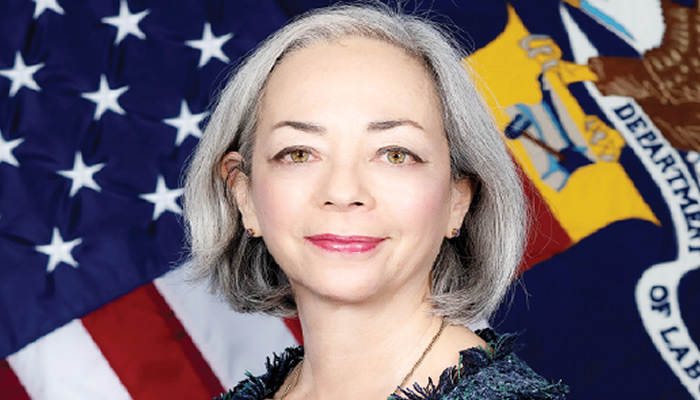
In this interview with ADELANI ADEPEGBA, United States Deputy Undersecretary for International Affairs, Thea Lee, speaks on the US campaign to eliminate child labour in the cocoa sector in Nigeria
What informed the policy on tackling child Labour in the agric sector in West Africa?
We’ve been working for a long time with the government of Nigeria. And Nigeria in 2019 became what we called the path-finder country to join the alliance 8.7 to address child labour. We’ve also done a lot of work on child labour in the cocoa sector in Cote D’Ivoire and Ghana. We know Nigeria is also into expanding cocoa production. So the project that Secretary of Labour, Martin Walsh announced on Tuesday December 13 is the award of a $4 million project to the International Labour Organization to assist both the government of Nigeria and ECOWAS. Both of those entities have made commitments to combat child labour. So, the government of Nigeria has a national action plan; we want to make sure that they have the resource systems, skills and the focus that they need to meet their goals, the objective of eliminating, eradicating child labour and ECOWAS is doing the work of coordinating regionally. So this project is over four years. It goes through the end of this year to December in 2026. The idea is there are several key objectives to increase capacity in ECOWAS and the Nigerian government; I think in particular for Nigeria. We want Nigeria to be able to achieve international action plan on child labour and a couple of key activities. Promoting the enactment of the revised labour standards bill, which is currently before the National Assembly and also Nigeria hazardous work list was very important to identify which are the areas that are not appropriate for children because of the dangers involved. The second is to support the federal ministry of labour and employment in building the capacity of labour inspectors and agricultural extension officers to promote occupational safety and health in the agriculture sector. The third is supporting the mainstreaming of child labour to Nigeria’s National Development from 2026 to 2031. So really it is about capacity building and in our annual reporting on child labour and of course, forms of child labour, Nigeria received a moderate advancement, which is okay, but there are a couple of key areas where some improvements could be made, especially around labour inspection and enforcement but also making sure that there is clarity in the law about the minimum age for employment of children. So I think that the motive for the project is working partnership with the government of Nigeria and ECOWAS and achieving our shared goals around eliminating child labour.
What is the level of involvement of the states? You know that most of the child labour or anti-labour practices happen in states, not at the federal level.
Yeah, that’s a big question. And I think in particular, I think one of the focuses will be in Ondo state and then to be working on cocoa production and making sure the community action plan which we have worked on with Code D’Ivoire and Ghana can be implemented at the level in Ondo State. I think all of these have basically the coordination between countries. So, that’s the regional coordination that ECOWAS does. You do need the national body and the federal body; you need the resources for labour inspectors and the training for labour inspectors and the will to go on and on and to do unannounced inspections and to be able to look forward to penalties when there are problems that are frowned on the other side and then, of course, as you say at the state level and this is true. I think in most countries that there are a lot of responsibility resources that are needed at the state level as well. So, this one I think the focus will be in Ondo state as well as the national government and then the regional toward nations through ECOWAS.
If you don’t tackle poverty, it might be difficult to address the issue of child labour. Is there any element of this programme that is meant to address poverty?
That is really an excellent question and it’s absolutely right that children go to work so that their parents can earn a decent living if they don’t have good jobs. This project is $4m over four years, so I think it’s probably not at a scale that it can address all those issues. This is something that the US Labour Department is very interested in and some of our other work, I would say more broadly focused on what the International Labour Organization calls decent work and making sure that every worker, including adult workers can have access to good job, they can organize a union and bargain collectively, if they want to do so; there is decent pay, there is social protection, all of those things go hand in hand and I think really important to eradicate child labour. I totally agree with you that to take child labour in isolation, you’re probably not going to succeed. You can put children out of child labour and say ‘send them to school,’ but if you don’t address the underlying problems and the lack of good jobs; once the problem ends, they’re going to go back to school. A really important element in addressing child labour is making sure the kids are in school and not in the workplace.
There are about 20 million out-of-school children in Nigeria and of course, there are people who would want to take advantage of some of these children. So does any aspect of this campaign address this?
Oh, I think it will. Whenever we work on child labour, it’s always trying to make sure that there are both resources and information. Part of it too is for Nigeria changing the laws that make it illegal to employ children who should still be in education. So if the minimum age for education is, let’s say 16 or 17, then the minimum age for employment should be matched up with the minimum age for education so that the laws can be given processes. That’s been one of the recommendations that we’ve made to the Nigerian government. We hope that will be addressed in the legislation.
What is the impact of the programme in other West African countries where it has been carried out and do you expect the same impact in Nigeria or at a bigger level?
Yeah. Well, you know, we’ve done a lot of work in Cote D’Ivoire and Ghana on child labour and I’d say mixed results. You know over the last two years there are still a lot of children in child labour unfortunately in the cocoa sector in those countries despite all the work that we’ve done, but you can also look at the number of ways the sector has grown. I think we still have a lot more to do. I would say that we are still trying to assess the effectiveness of our programmes to make sure that every programme that we do is learning from past programmes. You know one thing that I would say is that we need to connect up. All of the conversations the United States government might have with a country, whether it’s trade or investment or aid or diplomacy, is to make sure that we are all sending the same messaging. And I think for a long time labour rights is kind of a lower priority and therefore, it got lost in the shuffle, but this government, the Biden administration and secretary Marty Walsh are really very close to what they call two things: One is a foreign policy for the middle class and one per cent for trade policy. So, this is something that we aspire to do, to send a consistent message across the board to every government that our trade policy, our investment policy, our foreign policy are all going to have a priority on protecting workers human rights, workers rights, and democracy.
When you implemented this programme in Ghana and Cote D’Ivoire, what are the gaps that you observed, what did you learn from them which you can apply to the Nigerian case?
We did some good research I think in coordination with the State Department; there was a 2020 country report by NORC National Opinion Research Centre, University of Chicago). There were two million children engaged in hazardous work on cocoa fields in Cote D’Ivoire and Ghana in 2020. And that was basically to me a failure after 10 years of work; we should be seeing some improvements. And so a lot of the work that was done was about community-led action; we provided over 27, 000 children and 5,000 families with education and livelihood services; supported safe work environments through protecting occupation of the health and safety making sure that those standards were increased. So I think that was an improvement and one of the things in particular that we see in both Cote D’Ivoire and Ghana; the percent of children attending school in the cocoa-growing areas increased in Cote D’Ivoire from 58 per cent to 80 per cent and in Ghana up from 89 to 96 per cent between 2009 and 2019. So, that was I think to your earlier point that there were some improvements.
Civil society groups and the media are very crucial to the success of this campaign. So what roles have you mapped out for them?
That’s a good question and I think we have a couple of organizations that we hope to be working with. So, the International Labour Organization proposes to work with three partners in Ondo state. One is an under-base NGO, Restoration of the Dignity of Womanhood; another NGO in Ondo, Kids and Teens Resource Center and an international NGO, Past Down International. So the International Labor Organization as you know is the tripartite United Nations agency based in Geneva, but they have country offices, work at different levels. But for this particular project, I think it’s going to be very important that the ILO has strong civil society partners on the ground in Ondo that have the relationships and the networks and the trust and the confidence to be able to do this work. So, I think that will be critical to the success of this project, the strong civil society partners in Ondo state. We think the media is a very strong partner for us and we look forward to working with the media in Nigeria on this project as it unfolds.





